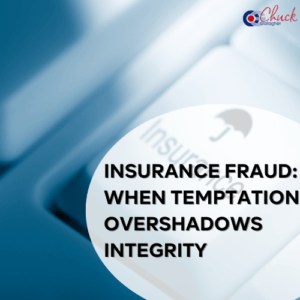 You’ve heard it countless times. “Just one little lie won’t hurt.” “Everyone does it; why shouldn’t I?” You’re about to step into a story that’ll send shivers down your spine and make you rethink the weight of those little lies. I’ve worked in the field of ethics and fraud prevention for years, and let me tell you, the fallout from insurance fraud is immense and often irreversible.
You’ve heard it countless times. “Just one little lie won’t hurt.” “Everyone does it; why shouldn’t I?” You’re about to step into a story that’ll send shivers down your spine and make you rethink the weight of those little lies. I’ve worked in the field of ethics and fraud prevention for years, and let me tell you, the fallout from insurance fraud is immense and often irreversible.
Enter Cory Fleming—a respectable lawyer loved and revered by his community. Letters poured in from friends and family, speaking to his character—a caring father, doting husband, and community pillar. And yet, in a packed courtroom, his dark secret was laid bare. His involvement in a $4.3 million insurance scam led to his sentencing to nearly four years in federal prison.
A blue-suited, crestfallen Fleming, visibly shaken and reduced to tears, was taken into custody immediately. The courtroom atmosphere was electric—filled with supporters, victims, journalists—all waiting with bated breath for the hammer of justice to drop. And drop it did.
The message was clear, as voiced by U.S. Judge Richard Gergel: “We must uphold the rule of law.” It’s not merely about one man’s descent into crime but a message to everyone contemplating a nefarious path. Even in a position of power and respect, there are lines you never cross.
Here’s the chilling bit. The money Fleming helped to embezzle was meant for the sons of Gloria Satterfield, a housekeeper who tragically died from a slip-and-fall accident. Instead, this cash was rerouted, with Fleming pocketing over $676,000. This wasn’t a faceless crime; it had tangible victims, their livelihoods toyed with for a quick buck.
The lead federal prosecutor, Emily Limehouse, hit the nail on the head when she remarked that lawyers should be held to higher standards. Indeed, it’s not just about legal retribution but the moral fabric of our society. The consequences of betrayal, especially for those in positions of trust, should be significant. The case underscores a reality many prefer to ignore: the line between right and wrong is often thinner than we’d like to admit.
But Fleming’s journey into the shadows didn’t begin and end with Satterfield’s estate. Allegations swirled around him, including other scams and thefts. Despite being portrayed as deceived by his accomplice, Murdaugh, the fact remains: he made a choice, and with it, consequences followed.
Such cases often bring to light the interconnected web of deception. Take Russell Laffitte— another individual involved in fraudulent activities with Murdaugh. He, too, faced the music, sentenced to seven years for his role in bank and wire fraud.
It’s a tale as old as time—temptation, falling from grace, and inevitable retribution. These high-profile cases aren’t anomalies but are glaring reminders of the catastrophic consequences of crossing ethical boundaries.
One of the more heart-wrenching pieces from this saga is a letter from Fleming’s wife, Eve. It brings to focus the collateral damage of such decisions. In her plea for mercy, she expressed her commitment to not defining her husband by his worst moments, illustrating the profound emotional and psychological toll on families.
If there’s one takeaway from this tale, it’s this: always choose integrity over temptation. As an ethics consultant, I’ve seen countless lives torn apart because of a few poor decisions. The allure of quick gains is undeniable, but the price—reputational damage, legal consequences, and shattered personal lives—is invariably too high.
Cory Fleming’s story serves as a cautionary tale. It’s an urgent call to action for all of us to evaluate our ethical compass and consider the long-term consequences of our actions. Because once lost, trust and reputation are near impossible to regain. The question remains: Is a temporary gain worth a lifetime of regret?


